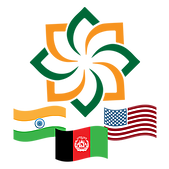India
- History
- Our Work
- Transforming Development Through Innovation & Partnership
- U.S.-India Triangular Cooperation
- Partnership for Energy Access and Security
- Partnership for Sustainable Forests in India
- Partnerships for Health
- Partnership for Education
- Partnership for Water Sanitation and Hygiene (WASH)
- Partnership for Food Security
- Partnership for Gender Equality
- Investing in Afghanistan
- Foreign Assistance Data
- Newsroom
- Newsletters and Fact Sheets
- Speeches
- Resources For Implementing Partners (RFIP)
- Careers
- Partnership Opportunities
- Success Stories
Speeches Shim

USAID/India works to harness private sector investment and foster trade between India, Afghanistan, and the United States. This trilateral collaboration strengthens economic and regional stability across many sectors to support Afghanistan as part of the U.S. strategy for South Asia.
TRADE AND INVESTMENT
USAID/India and USAID/Afghanistan hosted “Passage to Prosperity: India-Afghanistan Trade and Investment Show” on September 27-30, 2017, in New Delhi. Over 1,000 Indian businesses attended looking to secure opportunities with over 200 Afghan businesses. Afghan government and NGO participants in health, education, and clean energy generated potential partnerships and investments with Indian social sector individuals and organizations. Indian buyers and Afghan vendors signed more than $27 million in contracts for agricultural products. In addition, a number of Indian buyers and Afghan vendors signed MOUs valued at nearly $214 million. Participants bought over $10 million worth of carpets, gemstones, jewelry, marble, and food-related products during the public event.
IMPROVING ACCESS TO QUALITY HEALTHCARE
In India, healthcare outcomes have been improving steadily the past few years. Investments from the government and private sector have increased; access to health care services has improved; polio has been eradicated; and maternal and infant mortality declines are amongst the highest globally. The strategies, approaches, and innovations adopted by India to achieve these health outcomes can benefit Afghanistan. USAID/India works with USAID/Afghanistan to establish systems for transfer and adoption of promising healthcare solutions. USAID has facilitated meetings between Indian and Afghanistan policy makers, social entrepreneurs, and private business enterprises to help deploy these solutions in Afghanistan. Recently, USAID/India provided technical support to help expand successful biometric technology solutions in India to improve treatment adherence among tuberculosis patients to Afghanistan.
WOMEN’S ECONOMIC EMPOWERMENT
The Self Employed Women's Association (SEWA) is the world's largest women's trade union. SEWA has more than 1.9 million cooperative women members and works with government and civil society stakeholders in India, Afghanistan, and several other countries with the aim to empower women towards economic self-sufficiency. USAID supports SEWA to train 200 Afghan women to be Master Trainers and 3,000 Afghan women across five Afghan provinces in vocational skills such as embroidery, garment stitching, food processing, and jewelry making, as well as in leadership and marketing. The program is expanding to five additional provinces in Afghanistan to develop Afghan women’s vocational and marketing skills. A local Afghan NGO is being strengthened to sustain the program in Afghanistan.
MILLENNIUM ALLIANCE PROGRAM
USAID/India operates a grant for early-stage solutions to complex development challenges. The Millennium Alliance program takes a range of promising ideas, pilots these, tracks results from the interventions, and further invests in projects that demonstrate the potential to deliver effective results at scale. One example to be deployed in Afghanistan is the women’s Mobile Lifeline Channel (MIRA). MIRA provides critical information and services to semi-literate women on maternal and child health through mobile phones. The channel includes interactive components such as health trackers, messaging kits, and educational entertainment tools such as games, digital videos and storyteller applications. The channel connects women subscribers with primary health centers and institutions for timely delivery of medical care, and information related to home-based neonatal care and adolescent girls health.
REGIONAL ENERGY INTEGRATION
USAID’s South Asia Regional Initiative for Energy Integration (SARI/EI) accelerates regional economic development and energy security, promoting cross-border electricity trade among South Asian countries, including Afghanistan. SARI/EI supports legal and regulatory framework development and implementation, builds technical capacity in the public and private energy sectors, and helps establish an energy market. USAID customized a program to include Afghanistan to enhance power trading skills, hydropower planning, due diligence of hydro power projects, dispute resolution frameworks, and shared best practices on planning hydropower projects.
FOOD SECURITY AND NUTRITION
USAID/India’s Feed the Future program, in collaboration with India’s Ministry of Agriculture, sponsored a Triangular Training program which brought together over 1,500 agricultural professionals from across Africa and Asia, including Afghanistan, for training in India. In 2016, the National Institute of Agricultural Extension Management (MANAGE-India) conducted a course in Kabul showcasing agricultural innovations and advisory services that farmers access using information and communications technology. Following the training, the Afghan Ministry of Agriculture, Irrigation and Livestock (MAIL) implemented a management platform while MANAGE-India and MAIL-Afghanistan initiated distance learning courses to study and share agricultural best practices.


Comment
Make a general inquiry or suggest an improvement.